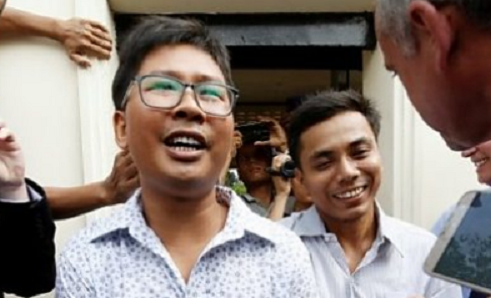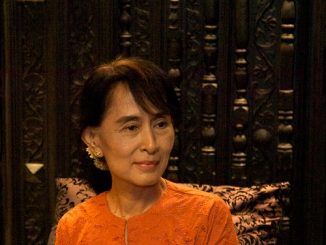
Two Reuters journalists jailed in Myanmar for their reporting on the Rohingya crisis have been freed.
Wa Lone, 33 and Kyaw Soe Oo, 29 were released after a presidential amnesty. They spent more than 500 days in prison on the outskirts of Yangon.
They had been convicted under the Official Secrets Act and sentenced to seven years in jail last September.
Their jailing was seen as an assault on press freedom and raised questions about Myanmar’s democracy.
As he left the prison, Wa Lone told the BBC’s Nick Beake that he would never stop being a journalist.
“I’m really happy and excited to see my family and my colleagues. I can’t wait to go to my newsroom,” he also told reporters.
Both men have families with young children. Wa Lone’s wife, Pan Ei Mon, only discovered she was pregnant after her husband’s arrest. He has only seen his daughter a handful of times on her visits to prison.
The journalists were released along with thousands of other prisoners as part of mass amnesties that take place annually around Myanmar’s new year.
Reuters’ Editor-in-Chief said the reporters – who last month won the prestigious Pulitzer Prize for their reporting – had become “symbols” of press freedom.
“We are enormously pleased Myanmar has released our courageous reporters,” Stephen J Adler said in a statement.
Their case was widely seen as a test of press freedom in Myanmar, and the country’s de facto leader Aung San Su Kyi – herself a former political prisoner – was criticised for defending the jailing of both journalists.
What were they investigating?
The pair are Myanmar citizens who were working for international news agency Reuters.
They had been collecting evidence about the murders of 10 Rohingya men by the army in the village of Inn Din in northern Rakhine in September 2017.
They were arrested before the report’s publication, after being handed some documents by two policemen who they had met at a restaurant for the first time.
A police witness testified during the trial that the restaurant meeting was a set-up to entrap the journalists.
The final report – a collaboration with other journalists – was considered extraordinary, because it gathered testimonies from a range of participants, including Buddhist villagers who confessed to killing Rohingya Muslims and torching their homes. Accounts from paramilitary police also directly implicated the military.
The military had previously released its own investigation into allegations of abuse in Rakhine, and exonerated itself of wrongdoing, despite large amounts of testimony from Rohingya refugees describing atrocities.
Authorities later launched their own probe into the Inn Din killings, confirming the massacre had taken place and promising to take action against those who had taken part.
Seven soldiers were sentenced to prison for their involvement in the killings.
The military said the soldiers would serve 10 years with hard labour for “contributing and participating in murder”.
The battle won but not the war
Nick Beake, BBC Myanmar correspondent, Yangon
There were chaotic scenes as the journalists were freed.
This was a press pack reporting on two of its own. It has been been personal for many Burmese reporters. They feared they too could end up in jail if the authorities didn’t like what they were writing.
The Reuters reporters may now be free but Aung San Suu Kyi’s government has watched them languish in jail for 18 months.
In that time, the authorities have arrested more journalists and activists which has prompted serious concerns about the future direction of the country.
Source: bbc.co.uk






Be the first to comment